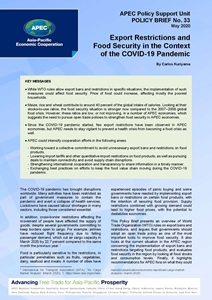Export Restrictions and Food Security in the Context of the COVID-19 Pandemic

| Published Date | May 2020 |
|---|---|
| Type of Publication | Reports |
| Publication Under | APEC Secretariat, APEC Policy Support Unit |
| Accessed | 10380 |
| Pages | 5 |
| Download publication | Download |
Description
Key messages from this policy brief are:
- While WTO rules allow export bans and restrictions in specific situations, the implementation of such measures could affect food security. Price of food could increase, affecting mostly the poorest households.
- Maize, rice and wheat contribute to around 40 percent of the global intake of calories. Looking at their stocks-to-use ratios, the food security situation is stronger now compared to the 2007–2008 global food crisis. However, these ratios are low, or not improving, in a number of APEC economies, which suggests the need to pursue open trade policies to strengthen food security in APEC economies.
- Since the COVID-19 pandemic started, few export restrictions have been observed in APEC economies, but APEC needs to stay vigilant to prevent a health crisis from becoming a food crisis as well.
- APEC could intensify cooperation efforts in the following areas:
- Working toward a collective commitment to avoid unnecessary export bans and restrictions on food products.
- Lowering import tariffs and other quantitative import restrictions on food products, as well as pursuing deals to maintain connectivity and avoid supply chain disruptions.
- Strengthening international cooperation and transparency to share information in a timely manner.
- Exchanging best practices on efforts to keep the food value chain moving during the COVID-19 pandemic.

